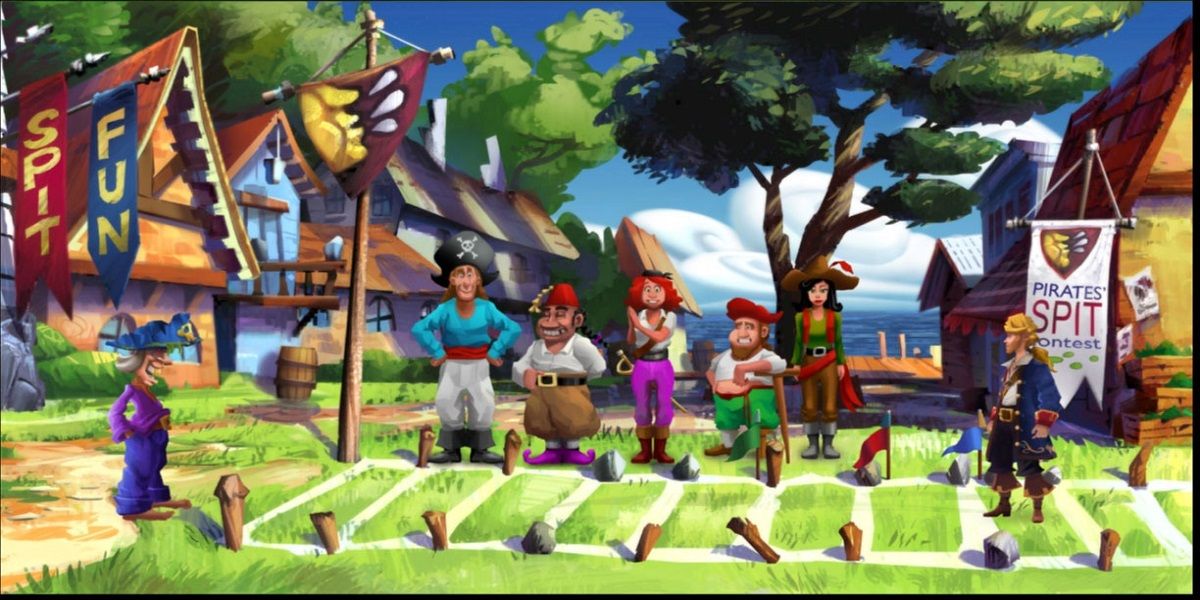The Monkey Island series remains the most celebrated and popular of all the point-and-click adventure games so ubiquitous of the '90s gaming scene. LucasArts releases such as Monkey Island, Grim Fandango, and Day of the Tentacle may appear primitive to unseasoned eyes, but there's no doubting the peculiar brand of challenge such games held for players during this halcyon era for the genre. Make no mistake, such titles may have seemed simple ostensibly, but they had plenty of potential to be punishingly difficult.
Toughest among all the main Monkey Island releases was undoubtedly the second game, LeChuck's Revenge, a fiendishly tricky chapter that still stands up today as an all-time classic. The Secret of Monkey Island may have eased players into the graphic adventure world with a relatively straightforward (though still immensely enjoyable) offering. However, LeChuck's Revenge ensured returning players received no easy ride.
The biggest distinction between the two titles is the extent to which LeChuck's Revenge demanded lateral thinking in order to succeed. With The Secret of Monkey Island, most puzzles' solutions were more immediate. The game guided players through its enthralling adventure via a series of logically progressing steps: a "building blocks" approach that felt rational and somewhat sequential.

LeChuck's Revenge, however, is Monkey Island with the stabilizers removed. Puzzle solutions are far more oblique and abstract, requiring players to use novel solutions to progress. Key to this is the game's emphasis on puzzle chaining, introducing multiple, interlocking issues, then forcing players to unravel them in sequence to complete each one. While this structure was in play in the first game, it became more prominent and more challenging in the sequel, especially since players need to spend much of their time hopping back and forth between islands rather than just relying on the puzzle and solution being present in the same location.
Not that the solutions are always especially apparent. The game's opening chapter, "The Largo Embargo," which involves ousting the de facto strongman governor of the island, tethers its action to a single main location while also keeping its goals relatively transparent. As the game continues and more variables are introduced, however, the capacity for oblique solutions increases exponentially.
Nowhere is this better typified than in the infamous "monkey wrench" puzzle on Phatt island, wherein protagonist Guybrush Threepwood must switch off a pump fueling a manually constructed waterfall. With no immediate tool or solution in sight, the player must travel back to Scabb island to hypnotize a piano-playing monkey to act as a petrified "monkey wrench," which is far from an obvious solution
LeChuck's Revenge requires players to use their logic skills and think outside the box, rewarding players for picking up on subtle hints dropped throughout its narrative. For instance, in a the game's second chapter, Guybrush loses an integral map piece (taken from Governor Marley) in a pile of identical paper fragments. To find it, he must use Marley's dog to sniff through the mound and locate the errant sheet. This solution relies on players remembering that Marley's dog has a knack for sniffing out her possessions, as the hound will bark at Guybrush when he exits her manner carrying any item stolen from her quarters.

Similarly, to win a spitting contest and receive a valuable prize, players must first realize that the furthest-flying spit is green, meaning a thick, green drink is required to win the competition. This means that players must return to to the Bloody Lipp Bar on Scabb island, then realize that the names of two available drinks (the Yellow Beard's Baby and Blue Whale) must be combined to create an appropriately lime-colored concoction.
Monkey Island 2: LeChuck's Revenge harkens back to a bygone era of gaming in which developers themselves had to think outside the box to produce challenges that would, in turn, force players to do the same. LeChuck's Revenge is a masterclass in how point-and-click adventure games could be both challenging and enjoyable regardless of their relatively primitive formats -- a lesson many modern games could still stand to learn. With a new Monkey Island recently announced entitled, fans will be anticipating more of the same brain-busting fun from Ron Gilbert and company's masterful franchise.


